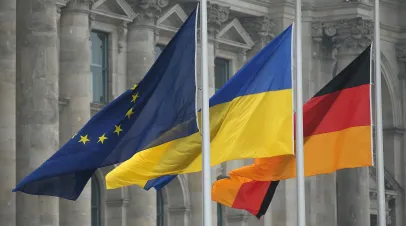Press
Read the latest news and commentary from the German Marshall Fund.
For press inquiries, please contact us by email at [email protected]. Or contact the press officers directly:
Angelina Sutalo, Senior Press Officer in Brussels at +32 486 514 479 or [email protected].
Lucy Fyler, Senior Communications Manager in Washington at +1 202 213 8574 or [email protected].
For press inquiries, please contact us by email at [email protected]. Or contact the press officers directly:
Angelina Sutalo, Senior Press Officer in Brussels at +32 486 514 479 or [email protected].
Lucy Fyler, Senior Communications Manager in Washington at +1 202 213 8574 or [email protected].
The Latest
Search
In the News
145 Results for:
Image

November 7, 2024
The breakup of Germany’s governing coalition further weakens Europe and support for Ukraine at a moment of uncertainty. ...
Translated from
French
Search
GMF News
4 Results for: